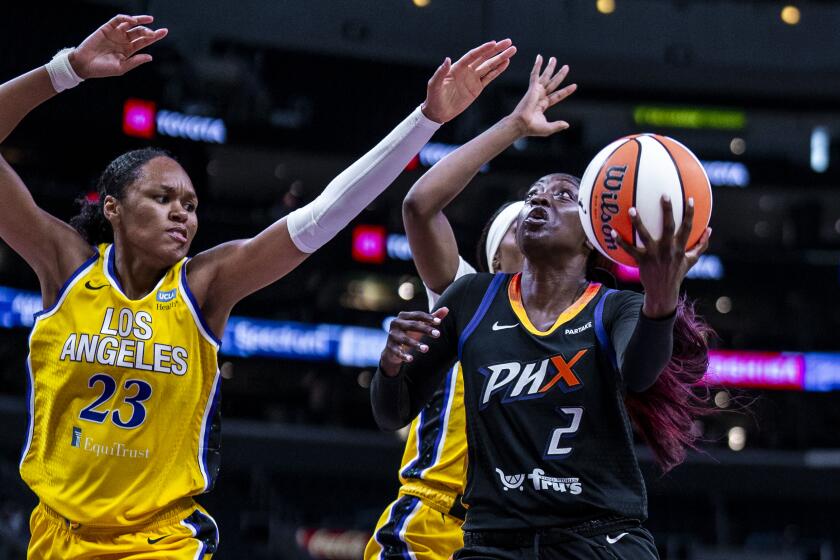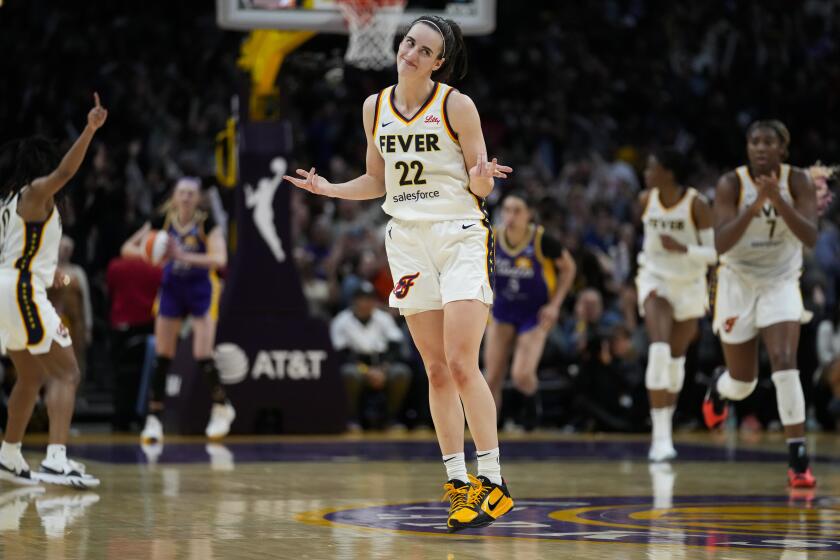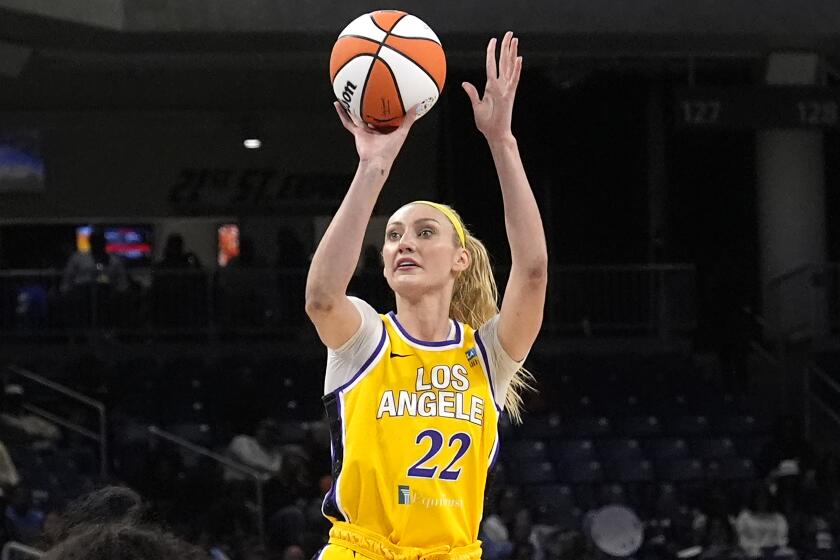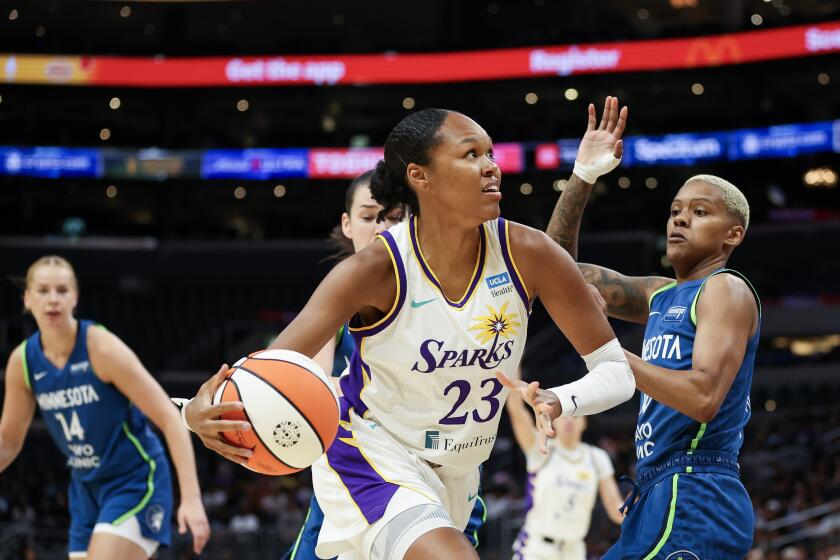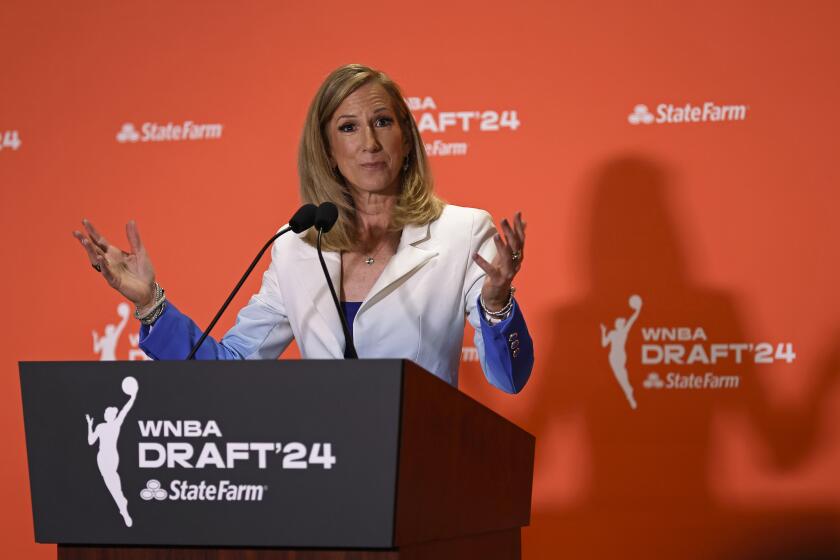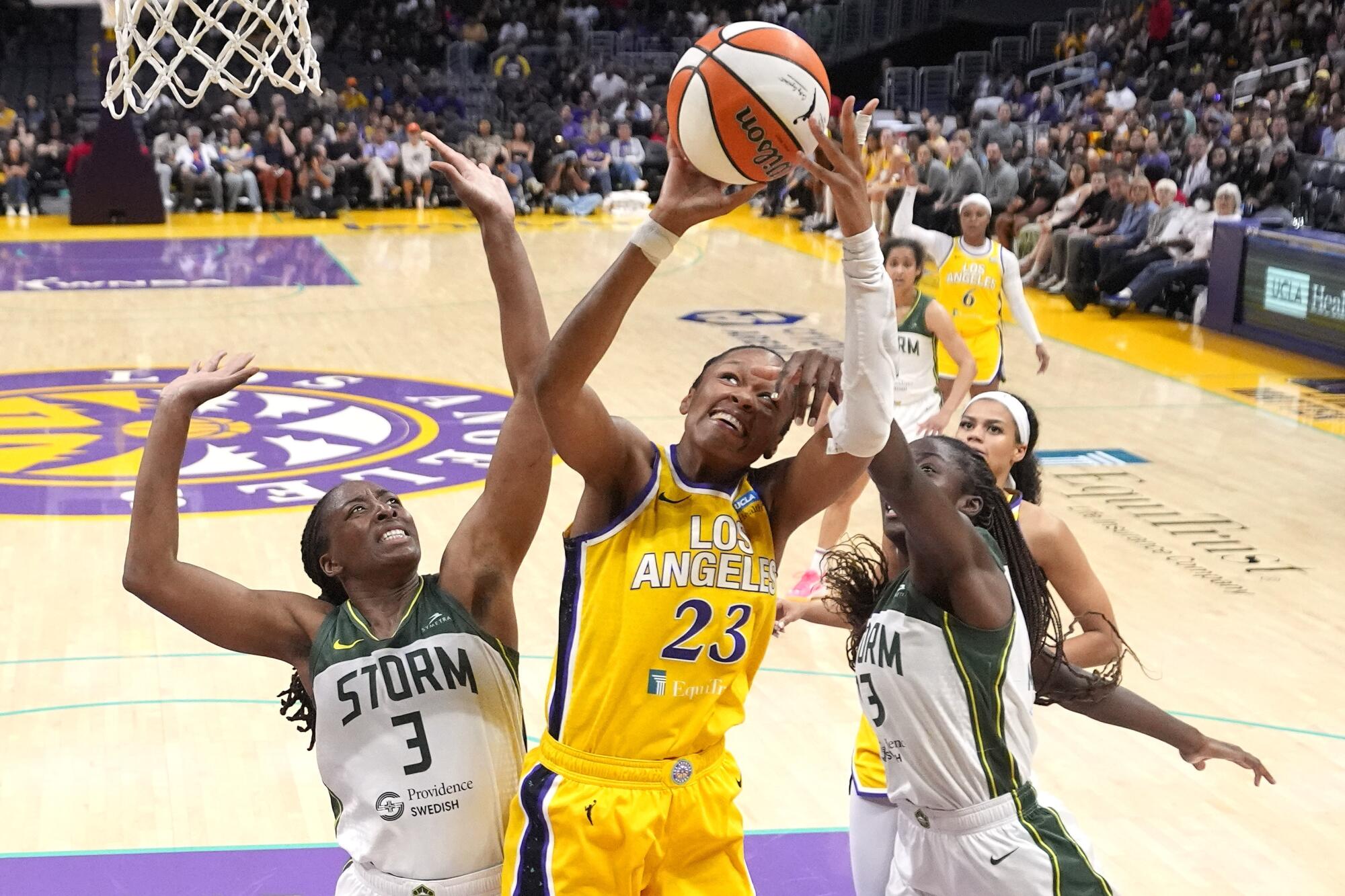
- Share via
It is a game involving the hottest league in America, yet the atmosphere on Figueroa is deathly cold.
On a recent midweek night in September, Crypto.com Arena is truly a crypt.
There are rows and rows of empty seats. Two people populate one entire section. Courtside contains more vacant chairs than fans.
One can hear every squeak of the shoes, every jeer from the loudmouths, every direction from the coaches.
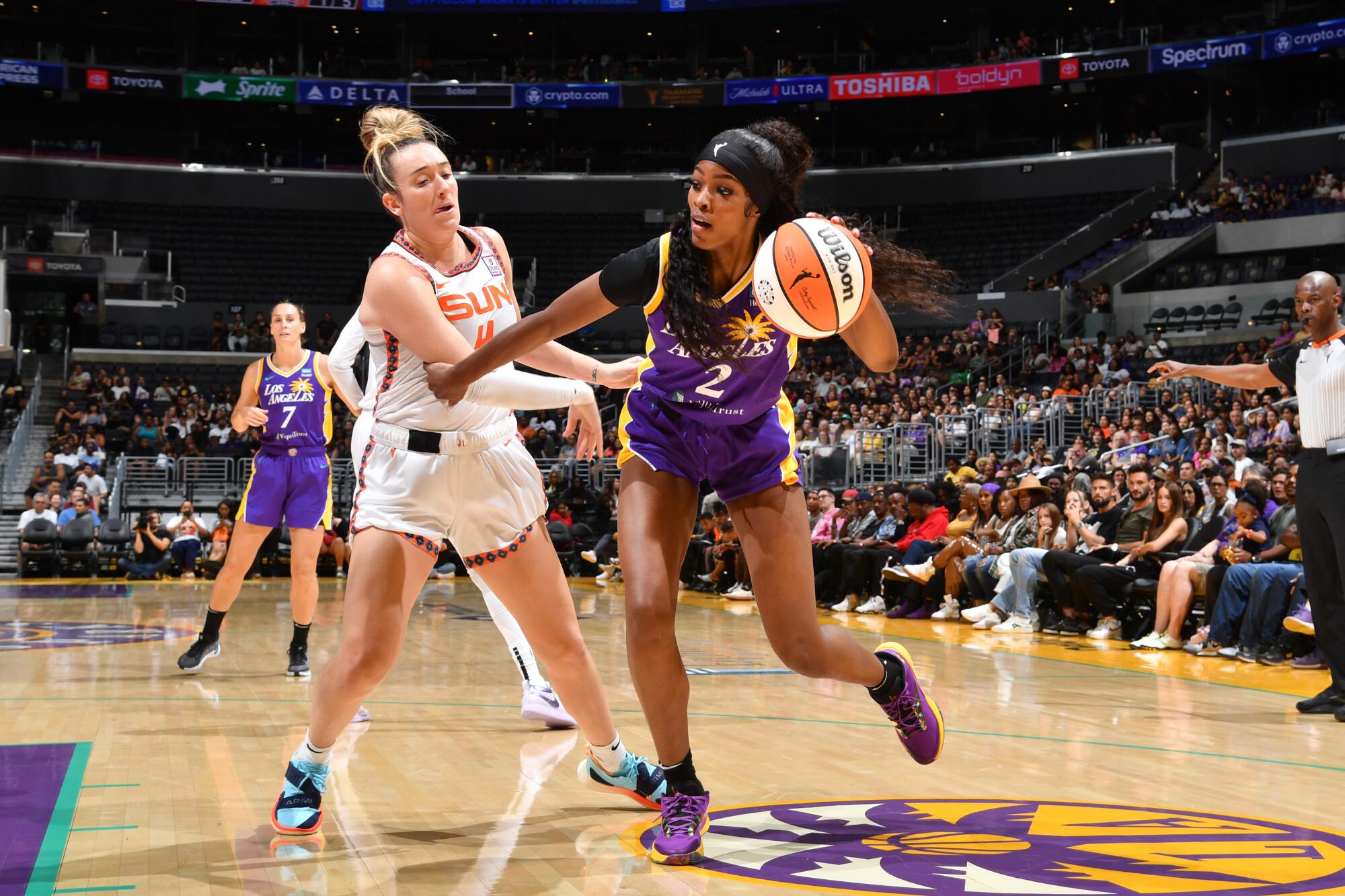
What should be one of the marquee teams in the burgeoning WNBA is playing a basketball game during what should be the most exciting part of the season.
Yet the Sparks stink, and people have stopped paying attention.
On this recent night, they are getting walloped by the playoff-bound Connecticut Sun in a game that illustrates one of the basic problems afflicting the Sparks. The Sun are led by 26 points from Marina Mabrey, one of several Connecticut stars capable of carrying this team deep in the playoffs.
Coming off a dysfunctional season 2022 season, new coach Curt Miller will be tasked with rebuilding the Sparks’ winning legacy in the WNBA.
You remember Mabrey, right? She initially was a Spark but was given away after one season for a second-round draft pick.
So goes the story of the Sparks’ season, which mercifully ends Thursday in Minnesota. Their best players have long since left town, their three championship trophies are covered in dust, and what remains is a young team fractured by injuries, reeling with no depth and still searching for a true star.
”Everybody should be mad at the Sparks,” said Magic Johnson, part of the Sparks’ six-person ownership group that includes five Dodgers owners. “Our fans should be mad. This is not what we all would want.”
In the 12-team league, the Sparks are last, sitting 25 games behind the first-place New York Liberty with a record of 7-32. In their 27-year history as one of three remaining original WNBA teams, the Sparks never have been this terrible, missing the playoffs for a team-worst fourth consecutive season while setting franchise records for defeats, futility and general irrelevance.
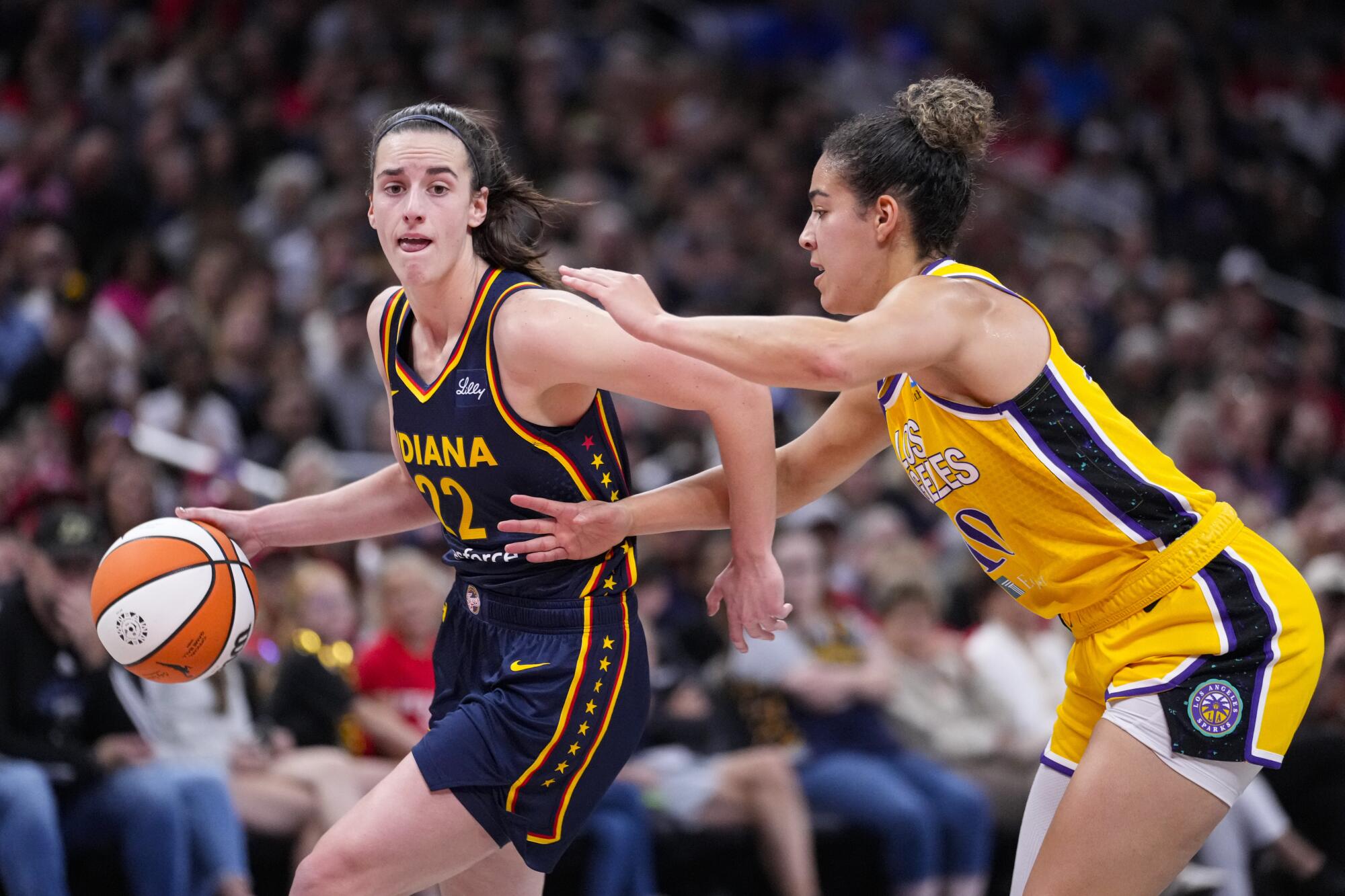
And their timing has been just awful.
In a WNBA season that has set countless attendance and viewership records, with the sports world fixated on the buzz from rookie stars like Caitlin Clark and Angel Reese mixed with the greatness of established stars like A’ja Wilson and Breanna Stewart, the Sparks have become the team that the trend forgot.
They rank fourth in the league in attendance, averaging more than 11,000 fans a night with a healthy crowd appearing for the home finale Tuesday. But many of those come to cheer for the opposing team, and, in recent weeks, many have just stopped showing up.
Despite a career-high 22 points from rookie Rickea Jackson and 25 points from Dearica Hamby, the Sparks can’t hold on in an 84-78 loss to Phoenix.
And they’re not just losing fans, but also players.
A championship operation that was once a destination for legends, the Sparks have become a franchise that stars have fled for other teams.
In the last few years, they’ve lost Candace Parker, Chelsea Gray and, most recently, Nneka Ogwumike. Those are huge defections when you realize either Ogwumike or Parker was considered their best player for each of the previous 13 years.
They were left this season with a rebuilding job that became impossible when they lost the No. 2 overall draft pick, Cameron Brink, to a knee injury, guard Lexi Brown to Crohn’s disease and several other players to a variety of ailments.
Caitlin Clark delivered an inspiring L.A. debut during a Friday night win over the Sparks, facing down bruising defenses and crushing criticism.
They had no real stars, their main attractions being the improved Dearica Hamby and exciting rookie Rickea Jackson.
“The injuries and illnesses are hard to overcome with a young team on a build mode,” said coach Curt Miller, a two-time WNBA coach of the year who arrived here from Connecticut two years ago as a savior and has since gone 24-56.
“I’m disappointed that I haven’t been able to get them to overachieve,” Miller said. “We’ve gotten them to compete for three quarters, but I haven’t been able to get them to the finish line.”
Sparks rookie Cameron Brink suffered a torn ACL in a loss to the Connecticut Sun on Tuesday night. The injury typically ends a player’s season.
Everyone around the franchise talks excitedly about a future in which the Sparks are favored to get the No. 1 draft pick via the league’s draft lottery and change their narrative with Connecticut guard Paige Bueckers, but that doesn’t address the root of all their problems.
Hollywood’s team doesn’t even have a home.
While the Sparks play at Crypto.com, they practice at El Camino College in Torrance. They don’t have a permanent locker room. They don’t have a permanent weight room. They are a professional team renting space at a junior college, and the optics are terrible. As one of the few WNBA teams that doesn’t have either a new facility or one under construction, they are at a huge disadvantage when it comes to attracting free agents.
No super team is coming here. Not a chance.
”Not having a permanent practice facility really hurts,” said Brian Agler, the Sparks’ last championship coach in 2016 and currently the athletic director at Wittenberg (Ohio) University.
“If everything else is equal, Los Angeles is a great place for players, but they want their own space, their own locker room, their own training room, their own strength centers, and when they see where it exists in other places and not in L.A. ... it just hurts.”
Sparks All-Star forward Dearica Hamby sued the WNBA and her former team in federal court Monday regarding her treatment from the Aces while pregnant.
The Sparks’ ownership group has the money. The group is the core of a business that just spent over $1 billion on the Dodgers, so, yeah, they have the bucks.
What they don’t have, with the exception of managing partner Eric Holoman, is the commitment.
The Sparks’ owners are arguably the least involved with the team as any sports owners in town. The fans rarely see them at the games. They don’t connect with the community. And for all their resources, they are either unwilling or unable to pony up for a practice facility.
They can’t even figure out how to erect a statue of Lisa Leslie outside Crypto.com Arena — she built this franchise! — and how sad is that?
In an interview this week with Johnson, he said he gets it. He said he understands the frustration. He vows to make it better.
“I’m going to get more involved,” he said. “It’s probably been my fault that I’ve let Eric Holoman make all the decisions and us as the owners, we’ve been sitting back a little. I think I have to get more involved, and I’ll do that, that’s a commitment to the fans, that I will get more involved and be part of it more to help bring the Sparks back to a championship level.”
Dearica Hamby led all scorers, but the ailing Sparks lost at home to the Minnesota Lynx Tuesday night.
Johnson is understandably stretched thin by his stakes in ownership of six professional sports franchises. But the Sparks should move to the top of his list. Los Angeles should be a WNBA cornerstone, not a joke. The fans and the league deserve a team in this town that not only competes, but also entertains, and the Sparks do neither. Every other pro team here does whatever it takes to win. The Sparks do just enough to lose.
“That’s my fault,” Johnson said. “It’s not about not paying attention. It’s about being involved.”
His work should start with examining a management team that last spring somehow passed on drafting Angel Reese, the Chicago Sky star who would have been perfect for this environment. The Sparks need flashy stars and Johnson has to insist they find them.
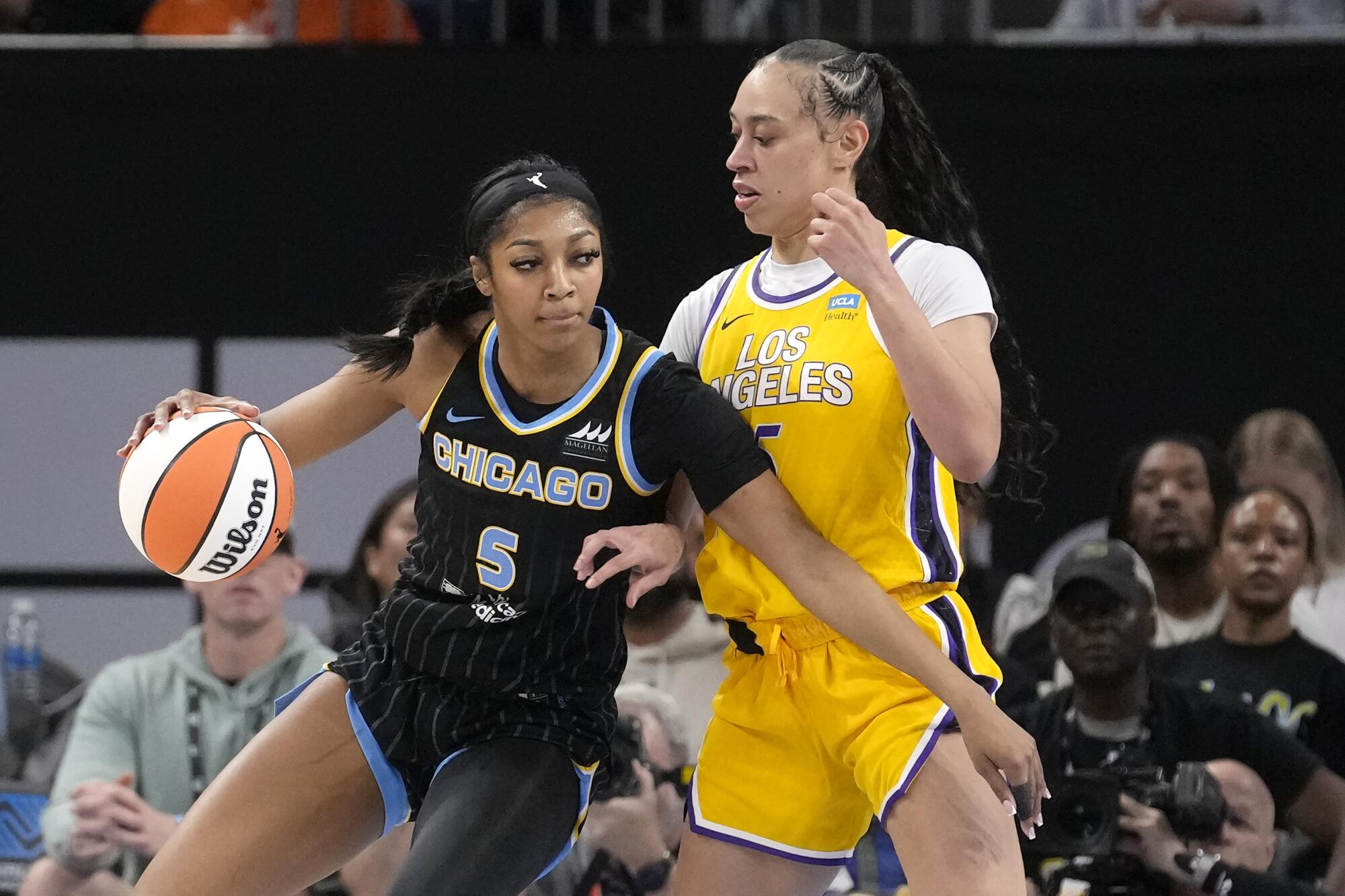
His work will continue in evaluating Miller, about whom he would not give a vote of confidence.
“We wait until the season is over and we look at everybody. … There’s nothing I can tell you right now,” he said. “Curt has been up against it because injuries have hurt us … but you’ve got to look at it from both sides. ... Did he make the proper adjustments, did he use the talent well? ... You also have to say, ‘Hey we are 7-32 for a reason.’”
Johnson also acknowledged that finding a permanent practice facility is a priority.
“We have real estate professionals out there looking for us to hopefully get a practice site,” he said. “We know what everybody else is doing, we know what they’re building. ... We’re smart and we know what’s going on out here. ... We know for us to compete we have to get a practice site like other teams have.”
Holoman took the promise a step further, saying in a text message, “I am confident we’ll not only have a facility but one of the best facilities in sports. I look forward to announcing specific details soon.”
The WNBA team in Portland, Ore., will be owned and operated by Raj Sports, led by Lisa Bhathal Merage and Alex Bhathal. They paid $125 million for the franchise.
OK. There it is. The promise. The plan. Everything the Sparks deserve.
We’re going to hold them to it.
“It should be the standard,” Hamby said of the practice facility. “I’m confident our organization is working on it.”
That’s the thing. A home for the Sparks shouldn’t be a perk, it should be the requirement. Like Hamby said, it should be the standard.
Women’s sports teams shouldn’t have to beg for the same sort of treatment offered to the men. Any team affiliated with the Dodgers should get the same advantages offered to the Dodgers.
What has happened to the Sparks isn’t simply about a mismanaged team. It’s about a mismanaged movement.
The WNBA is big time, and it’s high time Los Angeles start acting like it.
Here’s hoping Johnson lives up to his pledge and his ownership team starts acting like real owners.
Or here’s hoping they sell it to somebody who will.


